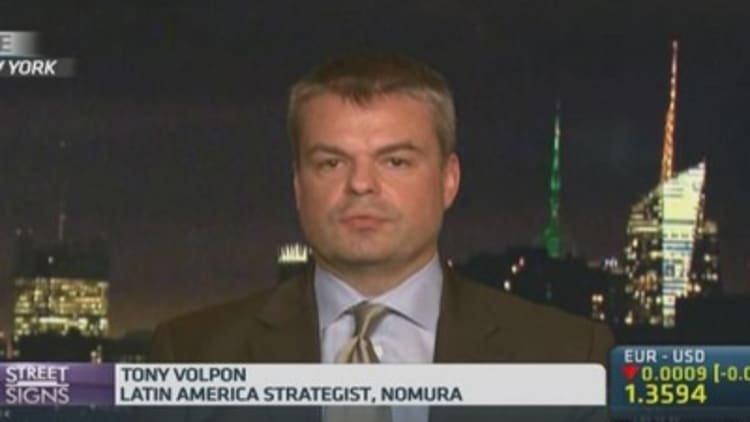Emerging markets experts are bearish on investing in Brazil regardless of the World Cup—but say fiscal reforms from a new administration could have a big effect.
"There's no upside for this government, even if everything goes well," Drausio Giacomelli, head of emerging markets research at Deutsche Bank, said Wednesday at the New York Society of Security Analysts Latin American Capital Markets Conference.
"It's not about (if Brazil wins the World Cup), it's about what it exposes: a government that's unable to deliver what they say the people need for education, for transportation, infrastructure in general," he said. "They can give stadiums ... but not what matters."
Brazil plays Saturday against Chile in the first game of the Cup's knockout round.

Giacomelli also criticized Brazil's monetary policy under President Dilma Rousseff.
Read More
"Brazil has gotten it wrong since the beginning of the Dilma cycle," he said about the country's recent interest rate hikes. "They put themselves in a situation that is the worst-case scenario for (emerging markets): stagflation—low growth and high inflation."
Luis Oganes, global head of emerging markets research at JPMorgan Chase, also touched on the political situation ahead of presidential elections in October.
"Inflation is still a problem, and unfortunately in Brazil cutting rates won't help growth," Oganes said at the conference. "You need reforms ... and ahead of an election no one is going to invest more in Brazil if they cut rates."
Read MoreIs change about to sweep Brazil?
Gaite Ali, an emerging markets equity portfolio manager at Morgan Stanley Investment Management, noted the potential upside of a new administration.
"Business confidence is very, very low in Brazil. Talk to any company and they're very gloomy about the prospects, the politics. So if you just put some things right, it's not that far out to start a virtuous cycle in Brazil," she said at the conference. "The rule of operating has been very haphazard in Brazil and that's really retrenched the appetite to invest by the private sector."
"The best-case scenario—which the market's hoping for and any Brazilian you speak to is hoping for—is one of the opposition leaders wins and puts the country on a path to reform," Ali said.
Read MoreErratic World Cup shakes up Goldman projections
Ali recommended several areas for selective investment despite Brazil's broad challenges. She mentioned industrial companies to capture infrastructure growth; financials and some consumer plays.
Ali is a manager of the TD Latin American Growth Fund. Its top holdings include Brazilian stocks Itau Unibanco, Petroleo Brasileiro Petrobras, Banco Bradesco and BRF Brasil Foods, according to mutual fund disclosures. A broader mutual fund she co-manages, the Morgan Stanley Institutional Fund Emerging Markets Portfolio, also has Petrobras and BRF in its top 10 holdings.
Ali emphasized that the business environment could improve with less government intervention in the economy.
"The thing with Brazil is I actually don't think a lot needs to change for the market to move and the outlook to change. They are all doable reforms that can happen," she said, noting later that "I would be quite positive if in fact one of the more reform-oriented outlooks transpires."
—By CNBC's Lawrence Delevingne






